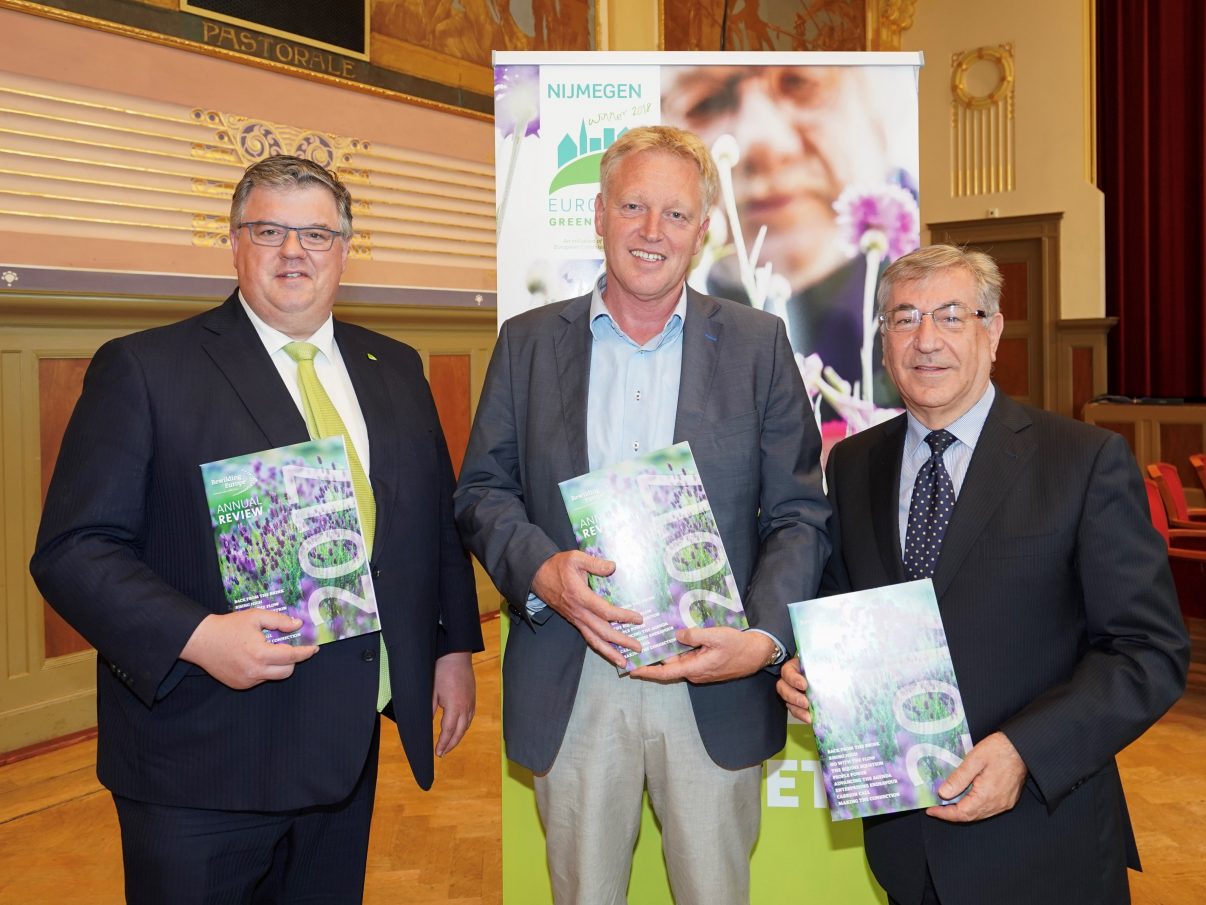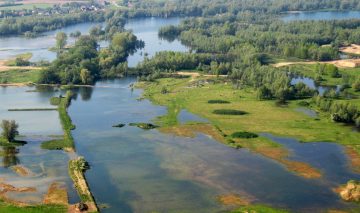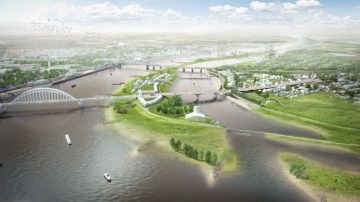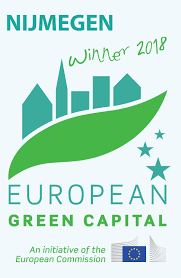The restoration of the River Waal in Nijmegen in the Netherlands is a showcase for contemporary rewilding. In June Rewilding Europe and the Municipality of Nijmegen led an excursion presenting the restoration to representatives of various European green cities.

The Gelderse Poort project, which has provided more space for the River Waal in the Nijmegen area and led to its ecological recovery, has not only made use of nature as an ally in reducing the damage caused by flooding, but enhanced the quality of life of people residing, working and playing here. As such, the Gelderse Poort is now a role model for the restoration of other rivers in Europe, with both people and nature benefitting from smart design and management.

This was the consensus of opinion in recent meetings held in the Bastei and the Vereeniging, and by distinguished participants of an excursion to the Stadswaard in Nijmegen organised by Rewilding Europe and the Municipality of Nijmegen as the EU Green Capital 2018. Together with representatives of the cities of Lisbon, Ghent, Lathi, Gabrovo, Horst aan de Maas, Sofia and Mechelen, the mayor of Nijmegen Hubert Bruls, Nijmegen city council member Harriët Tiemens and the mayors of Oslo and Essen appreciated the multiple benefits of this unique approach to river restoration. It was also noted that the Gelderse Poort represents the uppermost section of the Rhine Delta in the Netherlands, with developments here having great significance downriver.
Expert guidance on the excursion was provided by Frans Schepers and Wouter Helmer of the Nijmegen-based Rewilding Europe. Today Rewilding Europe’s efforts across the continent are allowing and inspiring a growing number of Europeans to reconnect with wild nature, and to earn a fair living from it through the development of nature-based economies.
Rewilding Europe is spearheading Europe’s burgeoning rewilding movement, with the initiative’s European Rewilding Network currently boasting 61 members from 26 European countries. These include a number from the Netherlands, such as the Millingerwaard, upstream from Nijmegen in the municipality of Berg en Dal.

During the excursion in the Stadswaard visitors saw how creating space for the river, combined with the comeback of wilder nature, creates an attractive and safer landscape for the residents of Nijmegen and upstream and downstream municipalities. With its unique location on the Waal, and new flood channels such as the Spiegelwaal and the Stadswaard, Nijmegen offers interesting lessons and inspiration for other European cities. Dating back to 1986, a vision for the Dutch river area (“Plan Stork”) provided a framework for this approach, which is now being applied on an extensive scale along Dutch rivers as part of the “Room for the Rivers” programme.
European Commissioner for Environment, Maritime Affairs and Fisheries, Karmenu Vella, visiting Nijmegen for the European Green Capital Awards ceremony, said: ‘’This innovative approach to river restoration is a great example of how the Water Framework Directive, the Nature Directives and Natura 2000 can work together. In combination, these instruments provide an effective approach to ecological restoration and rewilding, green economy and climate adaptation.
As this example shows, this can bring jobs, new enterprises, restore nature, reduce risks and costs, and help make our cities and regions more competitive. This is a positive approach that should be encouraged on a larger scale across Europe. I would like to thank the City of Nijmegen and the surrounding municipalities for making this idea a reality.’’
Frans Schepers, Managing Director of Rewilding Europe, believes the fact that Nijmegen is the Green Capital of Europe in 2018 makes the Gelderse Poort project a great opportunity to show how making more space for nature and restoring natural processes can help to solve modern environmental challenges, and to connect modern society with wilder nature.

“This is even more meaningful for myself because our initiative is headquartered in Nijmegen,” says Frans Schepers. “We are now supporting and working with a growing number of rewilding initiatives across Europe, and the exchange of experience and insight from projects such as this one is vital to the collective success of European rewilding.
“More and more people are now realising that it is simply not enough to preserve Europe’s existing nature,” continues Schepers. “The beneficial outcomes of the Gelderse Poort project demonstrate perfectly why restoration and rewilding should be the number one priority of European nature policy over the coming decades. ”
Nijmegen EU Green Capital 2018
Nijmegen has been awarded the title of European Green Capital 2018. Nijmegen is the first Dutch city to hold this title, following cities such as Copenhagen, Bristol, Ljubljana and Essen. The European Green Capital Award is an initiative of the European Commission. The title is awarded every year to a European city that leads the way in sustainability, thus serving as a source of inspiration for other cities. The winner then carries the title of European Green Capital for one year.
 Nijmegen – home of Rewilding Europe
Nijmegen – home of Rewilding Europe
Rewilding Europe is an initiative that works with local partner organisations across Europe on a network of innovative projects, including eight spectacular nature reserves of at least 100,000 hectares each. These showcase areas serve as an example of a new vision for Europe, where nature is more independent and the economy also benefits from a more natural landscape. By combining interests in an intelligent and sustainable way, as the example of the Gelderse Poort also shows (flood protection, nature development and resource extraction), these exemplary projects serve as inspiring and scalable examples for other areas in Europe. Together with scientific institutions and nature organisations from all over Europe, Rewilding Europe is working to anchor this new vision in European nature policy.
Rewilding Europe is located in the Campus of Nijmegen Radboud University, and works with partners in 17 European countries on its objectives. Financiers include the Dutch Postcode Lottery, the European Commission, private foundations and donors, the World Wild Fund for Nature and the European Investment Bank.
